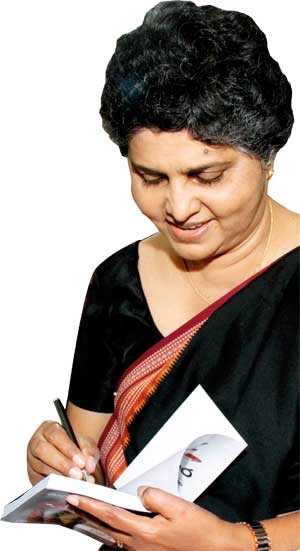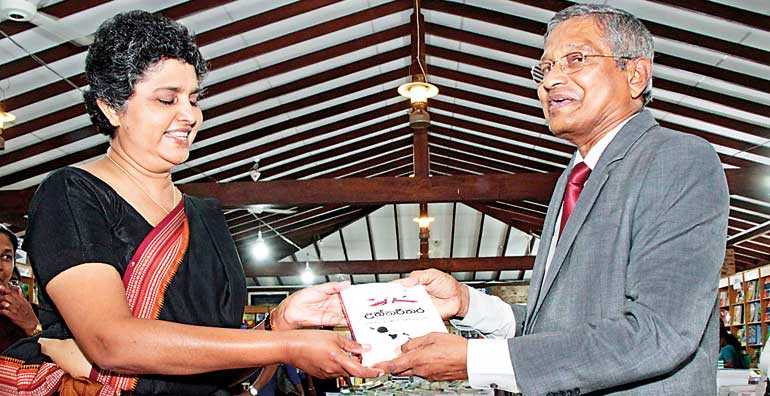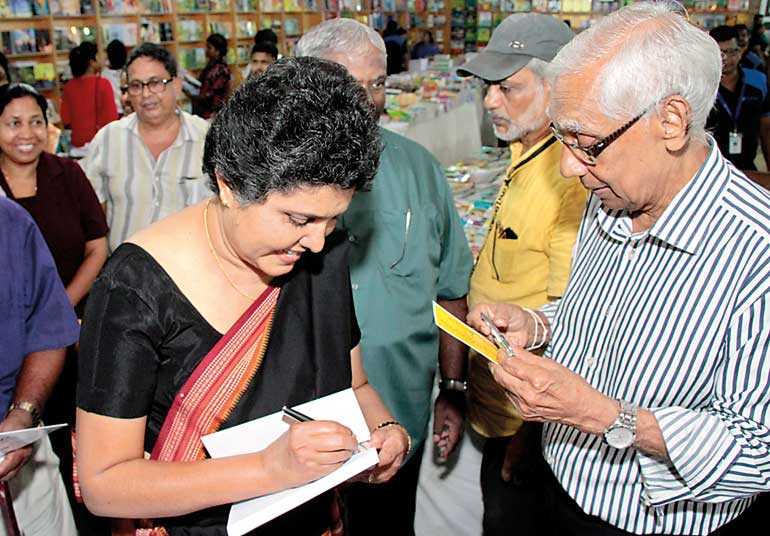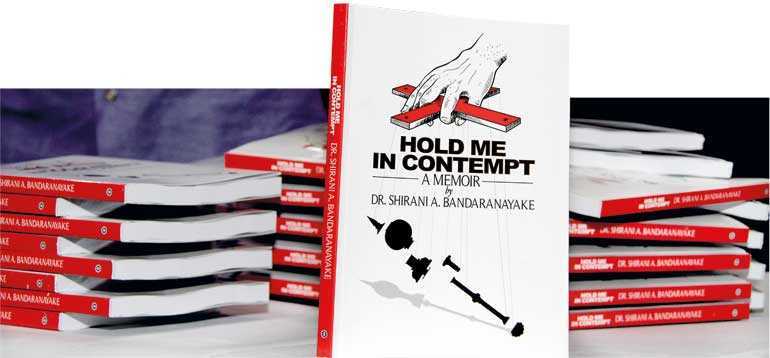Thursday Feb 19, 2026
Thursday Feb 19, 2026
Saturday, 26 October 2019 00:14 - - {{hitsCtrl.values.hits}}
By Chandani Kirinde
Her impeachment from the Office of Chief Justice seven years ago made headlines across the country and was flashed across the world. While a lot has been written and said about the infamous manner in which Dr. Shirani A. Bandaranayake was removed from office, little was known about her side of the story. That is until now.
In her recently released memoir ‘Hold Me in Contempt’, Bandaranayake lets readers in on her personal and professional struggles during this trying period, when she stood helpless but strong in the face of a relentless campaign against her from a Government which at the time enjoyed unprecedented power.
The decision to put pen to paper detailing hitherto unknown facts about what led to her impeachment was driven by her desire to set the record straight as “there was no clear picture as to what had actually taken place.”
“I thought I should put it down on paper because 10 years down the line no one will know what happened. Even my husband and son did not know certain details which I recounted in the book,” Dr. Bandaranayake told the Weekend FT.
Shirani Anshumala Bandaranayake took oaths as the 43rd Chief Justice of Sri Lanka on 19 May 2011 and while her elevation to the topmost job in the Judiciary was the crowning glory of her long career, the period from then until her impeachment in January 2013 was a time of deep disquiet.
“From the very moment I took my oaths as the 43rd Chief Justice of this country, I was facing problems,” Bandaranayake, who was also the first woman to be appointed to the post, recounts in her memoir.
There were early ominous signs that her tenure in office would test the uneasy relationship between the Judiciary and the other two branches of Government - the Legislature and the Executive - to the limit.
It began on the day of her swearing in, when she was asked by then-President Mahinda Rajapaksa to wait for a while as he wanted to talk to her. What she was expecting was a friendly chat with the First Citizen but the Executive had only one question for her - who was going to be the Secretary to the Judicial Service Commission (JSC)? He asked this of Bandaranayake because she had become the ex officio Chairperson of the JSC upon her appointment as Chief Justice.
"It began on the day of her swearing in, when she was asked by then-President Mahinda Rajapaksa to wait for a while as he wanted to talk to her. What she was expecting was a friendly chat with the First Citizen but the Executive had only one question for her - who was going to be the Secretary to the Judicial Service Commission (JSC)? He asked this of Bandaranayake because she had become the ex officio Chairperson of the JSC upon her appointment as Chief Justice"
Perplexed by the question, Bandaranayake had said the appointment would be made in accordance with the procedure laid down by the Constitution. One and a half years later, one of the charges of the impeachment motion brought against her was that she had overlooked “eligible officers” and had named a person who “is not a senior judicial officer” as Secretary to the JSC.
But her fait accompli may have had to do with the Supreme Court’s determination on the controversial Divineguma Bill, the brainchild of the all-powerful minister in the former Government, Basil Rajapaksa. Bandaranayake recollects how a meeting with two other judges who were hearing the petition regarding the Bill on 30 October 2012 was interrupted by her Secretary, telling her that the Minister of Justice was waiting to meet her in the anteroom of the CJ’s Chamber. The President had wanted to meet her and he had come to accompany her to his office. She had refused. Two days later, on 1 November 2012, a motion signed by 117 MPs was handed over to then-Speaker Chamal Rajapaksa which set in motion the process that ended with an impeachment motion being passed in Parliament on 11 January 2013, thus bringing an abrupt end her tenure as CJ.

Former Chief Justice Dr. Shirani A. Bandaranayake presenting her memoir to Sarasavi Publishers Chairman H.D. Premasiri at the book launch
During the intervening period, Bandaranayake sought the intervention of the Supreme Court, to give her reprieve from the unfolding ordeal, but her efforts were futile given the overbearing powers of both the Executive and Legislature that were pitted against her.
“The Legislature or the Executive were not willing to give an ear to reason with justification. They were hell-bent on achieving a single result. It was to oust me,” she writes.
Bandaranayake was reinstated as Chief Justice on 13 January 2015 after the election of President Maithripala Sirisena and retired less than two weeks later on 29 January 2015.
When asked if she felt vindicated by the turn of events which ended with her reinstatement to the Office of CJ, Bandaranayake said that when she looks back at how events unfolded during those tumultuous months, she realises “no justice has been done in place of the injustice I had to face.”
“I was simply thrown out of my position. The basic thing is to follow the rules of natural justice but even that was not given to me. Some used the impeachment as a springboard to personal gain. I only gained a net loss,” she says.
Life, as she says in her memoir, is stranger than fiction. “Things in my life have happened mostly by happenstance,” Bandaranayake says, as she reflects on the momentous events in her life. In her case, it has indeed been stranger than fiction.

Former Chief Justice Dr. Shirani A Bandaranayake autographing books at the Colombo Book Fair
